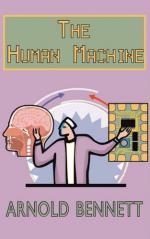When we have been engaged in the preliminaries to living for about fifty-five years, we begin to think about slacking off. Up till this period our reason for not having scientifically studied the art of living—the perfecting and use of the finer parts of the machine—is not that we have lacked leisure (most of us have enormous heaps of leisure), but that we have simply been too absorbed in the preliminaries, have, in fact, treated the preliminaries to the business as the business itself. Then at fifty-five we ought at last to begin to live our lives with professional skill, as a professional painter paints pictures. Yes, but we can’t. It is too late then. Neither painters, nor acrobats, nor any professionals can be formed at the age of fifty-five. Thus we finish our lives amateurishly, as we have begun them. And when the machine creaks and sets our teeth on edge, or refuses to obey the steering-wheel and deposits us in the ditch, we say: ‘Can’t be helped!’ or ’Doesn’t matter! It will be all the same a hundred years hence!’ or: ’I must make the best of things.’ And we try to believe that in accepting the status quo we have justified the status quo, and all the time we feel our insincerity.
You exclaim that I exaggerate. I do. To force into prominence an aspect of affairs usually overlooked, it is absolutely necessary to exaggerate. Poetic licence is one name for this kind of exaggeration. But I exaggerate very little indeed, much less than perhaps you think. I know that you are going to point out to me that vast numbers of people regularly spend a considerable portion of their leisure in striving after self-improvement. Granted! And I am glad of it. But I should be gladder if their strivings bore more closely upon the daily business of living, of self-expression without friction and without futile desires. See this man who regularly studies every evening of his life! He has genuinely understood the nature of poetry, and his taste is admirable. He recites verse with true feeling, and may be said to be highly cultivated. Poetry is a continual source of pleasure to him. True! But why is he always complaining about not receiving his deserts in the office? Why is he worried about finance? Why does he so often sulk with his wife? Why does he persist in eating more than his digestion will tolerate? It was not written in the book of fate




